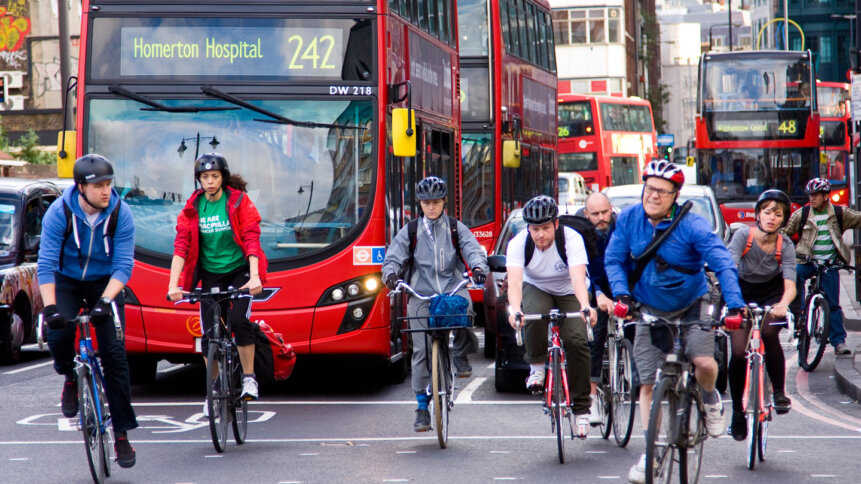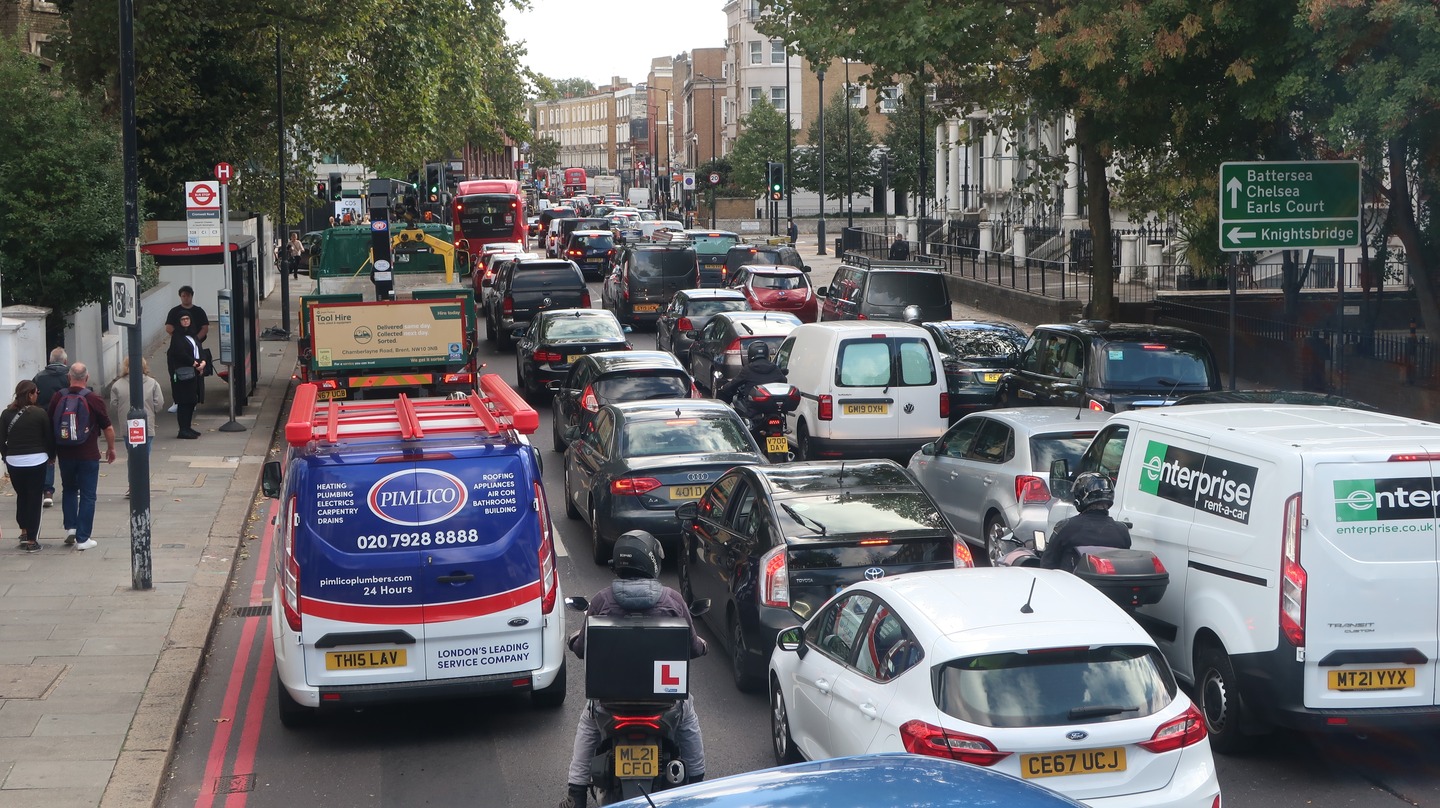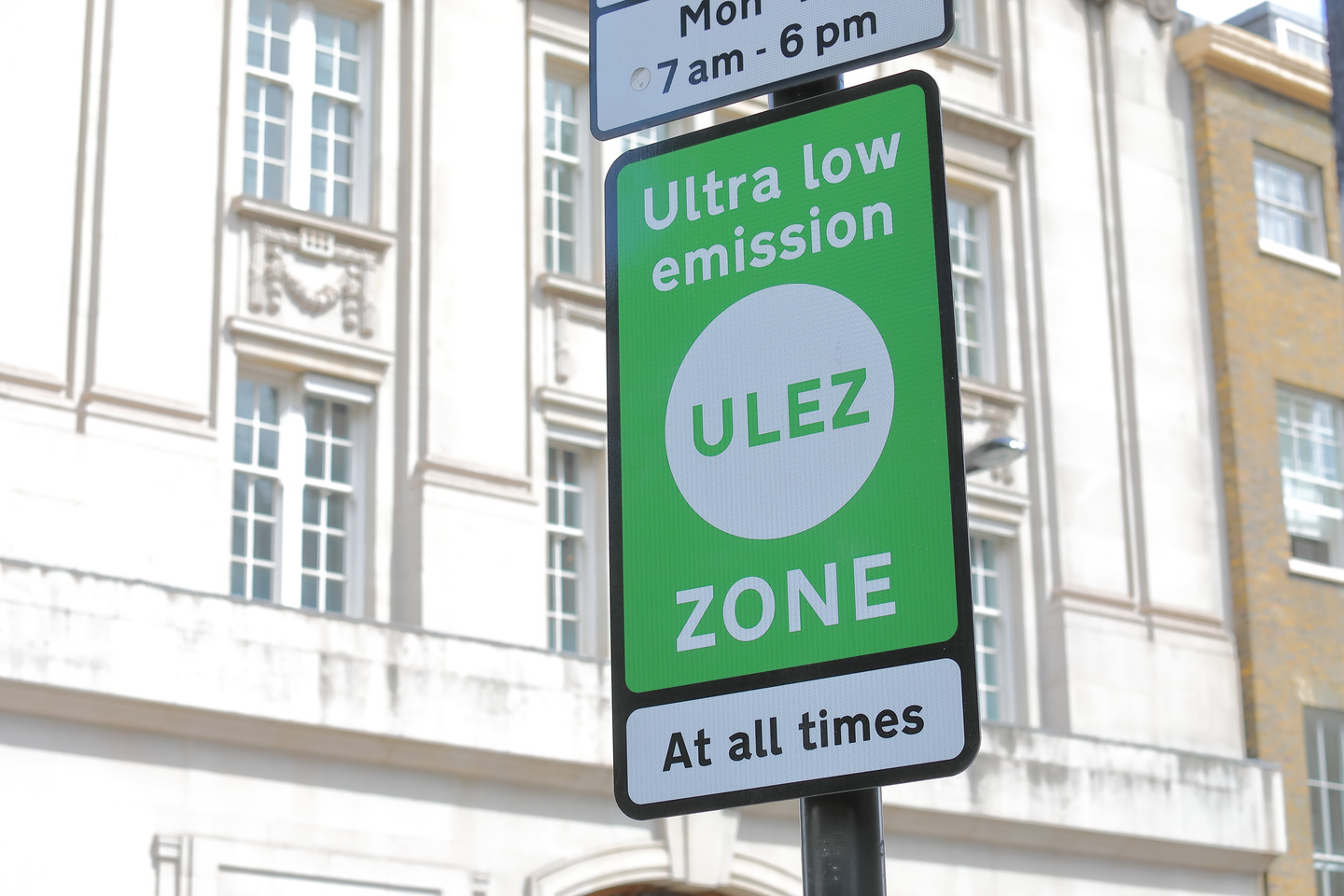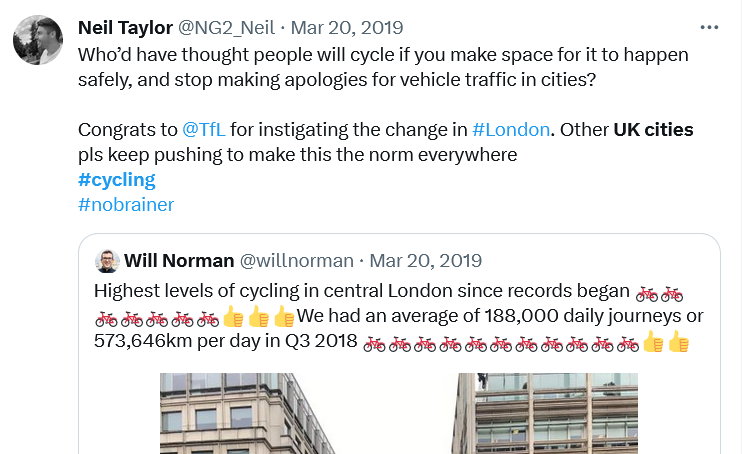Cycling to solve productivity crisis in UK cities?

• Cycling has been shown to increase happiness in UK cities.
• Cycing in cities has been promoted and encouraged for years in the UK.
• There’s at least some evidence that cycling in cities, rather than driving to and from work, can boost people’s productivity
The UK has lived in what it would be fair to call “interesting times” since 2016. The year of Brexit (known elsewhere as the year of Trump) brought chaos, political stagnation, economic confusion, and eventually a mass exodus of workers from the European Union as a legal break from the union took effect.
That was followed by Covid, with soaring death rates as the government, as it transpired, broke its own lockdown rules and partied while people around the country could not attend funerals for the ones they’d loved and lost.
The Queen, who had been on the throne for over seventy years, passed away.
Rocketing fuel prices, partly as a result of Vladimir Putin’s illegal invasion of Ukraine and partly because of an ideological refusal by the government to rein in energy company profits, even when asked to do so by the energy companies themselves added economic terror to everyone under 10 and over 50 as food or heat became a genuine question in the winter, and the rise in food poverty meant there were for the first time in half a century more charity-run food banks in the UK than there were McDonald’s restaurants.
And during the course of the last seven years, the UK has had five Prime Ministers, without once changing the party in power. One of those Prime Ministers lasted just 44 days and crashed the economy, while another has since resigned from parliament altogether ahead of being found to have lied both to the nation and the House of Commons, knowingly, about the debacle of Covid parties and lockdown rule-breaking.
All of this is not intended to paint the UK as a burning dumpster-fire hellscape straight out of a Trump speech. It’s simply by way of illustrating that when you discover there’s a productivity crisis in UK cities, there should be no sense in which it comes as a surprise. It would in fact be remarkable if there were not a productivity crisis after a time like that. The country’s been through a lot – and so have its workers.
So, what solutions have been suggested to such a productivity crisis? Massive investment in jobs and infrastructure, with a pathway from education to rewarding, taxpaying, house-affording work?
Well, yes, but inflation makes that difficult, and besides, the UK government has its hands full with a supposed crisis on its sea-border with France right now.
So, then… what’s the solution to the productivity crisis in UK cities?
Cycling.
No wait, come back. Recent research has revealed that cycling can, at least partially, tackle productivity slumps in UK cities.
Cycling in cities boosts happiness.
According to the research, the greater the number of cyclists you see on the roads in your region, the happier in general terms the region is likely to be.
Regions such as the South East and South West of England came out on top as being the happiest of all areas of Britain. Those areas have also been revealed to have higher life expectancies and less congestion on the roads. And one of the common factors between those regions is… a higher proportion of people cycling in the cities in those areas than elsewhere.
A coincidence, you say?

“One of us! One of us!” Would you like to be stuck in this?
Well, certainly, a healthy degree of scepticism regarding cause and effect pairs is always wise, but actually, it looks as though cycling beats the odds, especially when we take into account European cities that have high percentages of people committing to cycling to and from work, such as Amsterdam and Copenhagen (48% and 50% respectively), and a higher quality of life – Amsterdam is 6th and Copenhagen is 10th on the Quality of Life Index 2023.
London, meanwhile, lies a measly 65th on the list.
So, does the pursuit of happiness lead us to a bicycle? E-bike engineers Swytch Technology decided to find out with a first of its kind study to look at the link between cycling and happiness. And the results point to a categorical connection, with 15,356,000 Brits reporting that their mental health improves when walking or cycling for regular periods – which most people in cities would probably pay for if it came labelled as a therapy.
Cycling advocacy schemes in UK cities.
It’s no secret that the UK Government and local councils have tried to push cycling as the “go to” form of transport, particularly in cities, where road congestion is high, with Cycle to Work and Vision to Cycle schemes.
According to Swytch’s study, the schemes are working, with 6.3 million people saying that they plan to not own a car within the next five years. 4 million of those surveyed revealed that their preferred method of transport qualified as micromobility tools, including e-bikes and e-scooters.
Already, 3.8 million Brits now cycle or use an e-mode of transport to get to their place of work, a steady increase that continues each year. Over 9 million have reported that they no longer use a car to commute – and that can only grow as controversial schemes to charge motorists in outlying suburbs for driving into cities expand, as a way of tackling greenhouse gases and an urban air quality crisis. The British attitude to travel is certainly shifting from fifth gear back into more sustainable modes of transport.

Environmental fines are making driving in cities less attractive than it has been.
So, with more and more Brits jumping on their saddles and choosing to cycle as a way to commute, the question is – why do British towns and cities struggle to match the quality of life and mental health levels of their European counterparts? According to Swytch’s study, it could be down to those daily commutes from hell in the UK. The study found that 5.5 million Brits said their commutes were the most tiring part of their whole day.
Cycling in UK cities – honestly, less of a death-trap.
That might seem incredible to readers in the US, but it’s worth remembering that British cities have been evolving more or less since Roman times, and while there may be significantly less to cope with in terms of actual distance travelled, it is a trope that in the UK, chaos, carnage and bureaucracy will always expand to fit every inch of space provided.
When we consider that, in addition, 8.2 million Brits get queasy just thinking of using public transport despite the fact that it’s significantly more available there than it is in the US, it suggests that the route to better happiness levels and improved quality of life could be getting active and getting in a cycle lane.

Changes to make it easier to cycle in cities could boost productivity in the workforce.
An active commute, such as cycling, jogging, or walking, rather than a sedentary commute (cars, trains, buses), may be beneficial for both mental and physical health.
Being active may also have significant benefits to someone’s productivity. Swytch discovered that 4.83 million of those surveyed experienced a boost in productivity levels since they began cycling or walking to work. With a possible “productivity crisis” seizing the UK, a healthy change to daily commutes may be the answer to promoting improved productivity and happiness in the workplace.
Yes, the Cycle to Work scheme was introduced to lower congestion and encourage better physical health, but it may have profound impacts on a person’s mental wellbeing, as well as creating a more energized, engaged workforce.
The question remains – would it work in Manhattan?










